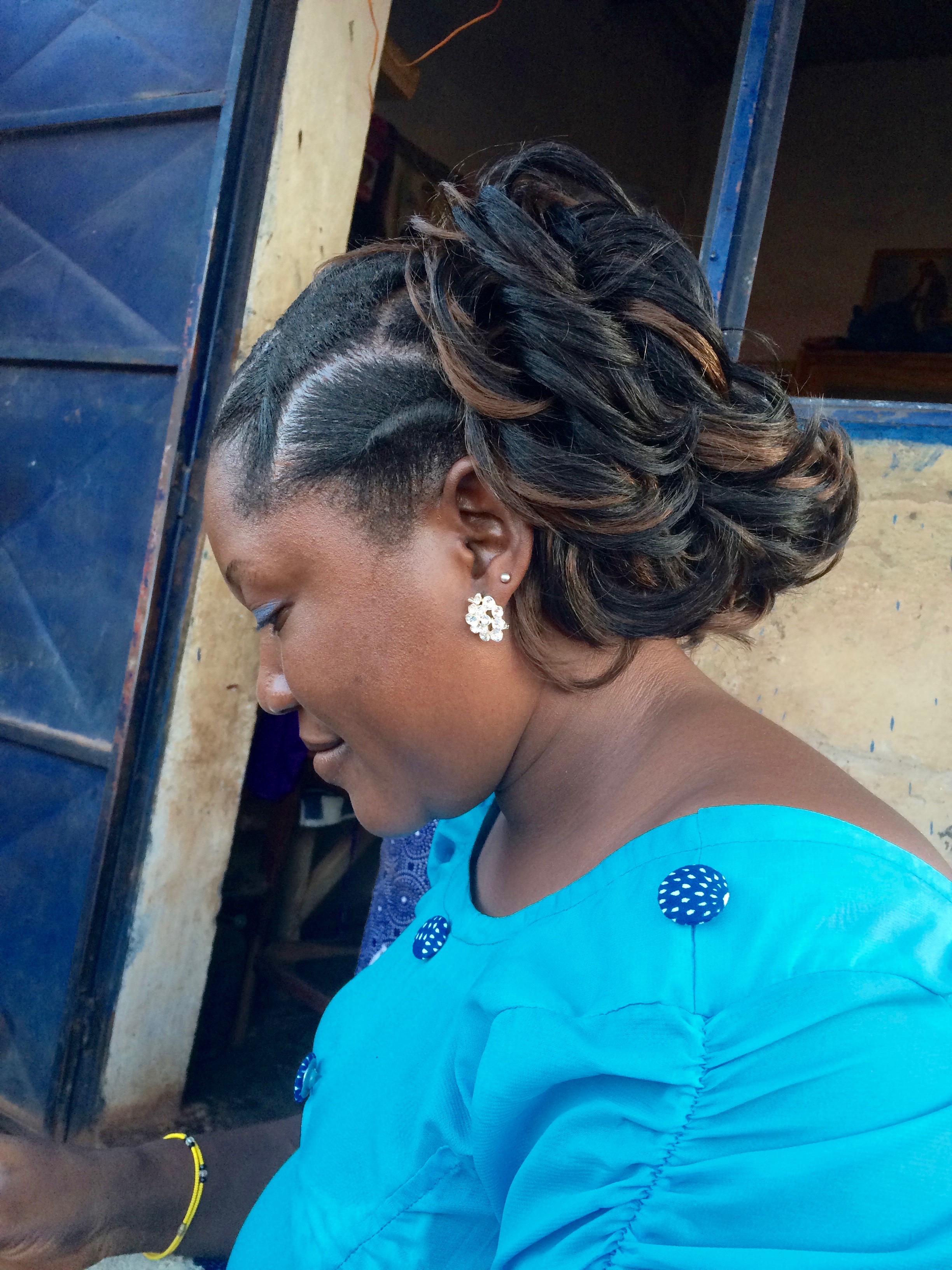A few nights ago I witnessed something that upset me. I was sitting in near darkness with two women, one of which was somewhat forcefully restraining her daughter so that the other women, bent over her, could finish her work. The child, barely four, was wailing and screaming, trying desperately to escape the pair who's stone-set faces showed no acknowledgment of how much pain the girl was in. Occasionally the crying would stop, then start up again, conjuring sounds of frustration from her mother who would occasionally tisk and straighten her daughter's body. The other woman's hands worked expertly, quickly, but watching I knew that no amount of skill or agility could change how painful it was or how it wold hurt for days some come. But it was, both women insisted, entirely necessary that this be done.
This child is not being excised. She is having her hair braided. For those of you that have never had an African woman braid your hair, whether corn rows or box braid, synthetic hair or not, I can tell you it is very painful, and it takes hours. They pull and twist and tighten each braid fiercely, as though you've done something to deserve it. Sleeping that first night it difficult, and the headache can last for up to two days. Needless to say, it isn't good for your hair either.
It is extremely rare to see a woman in Burkina Faso elect to wear her hair natural. From the age of a couple of months old a girl's hair is either coiffed, in a state of being coiffed, or in the uncomfortable middle ground between coifs. By the time girl hits 15, her hair line is already starting to recede and their natural hair is very thin, and by adulthood it is so severely damaged that the false hair or 'mesh' that women have attached to their heads can barely hold on. Despite the fact that shea butter, coconut oil and jojoba can be found in abundance here, women would rather a harsh chemical treatment and a new weave every two or so weeks. When I talk about hair care, even to Rita who has been responsible for the fate of more heads than a guillotine during the Reign of Terror, I get a cross-eyed look. Natural hair is neither desired nor encouraged to grow to its full potential.
This fact has made my recent transformation a little awkward. For those of you that don't vigorously scrutinize my social media accounts for signs of elusive selfies, I have recently cut off most of hair. This was a big deal for me, since I have been growing my hair out for nearly a decade and a half now in hopes of someday reachinig that holy grail that is shoulder-length. It's been a steady battle, my weapons of choice the comb, copious hair product and bobby pins. Despite these tried and true methods, my efforts are sometimes inadequate against the thousands of tiny strands fighting guerrilla warfare all over my head with the singular goal of making me look like a mad scientist. So when I was about 13, I called in reinforcements: a chemical relaxer. I have been chemically treating my hair for 13 years, and December 26th, 2015 was the first time since adolescence that I've had to face this unfamiliar yet totally natural tangle of curls.
A little background: I am a biracial adopted child and I grew up in a family of stunning straight haired women. Despite my Russian ancestry, my curls are nearly as tight as a West African's and just as uncooperative. As a child my mother learned to braid, corn row and twist, but nothing she did could ever slake my desire for long, straight hair. Through the years I struggled through different hair styles and levels of acceptance of my curls, finally reaching a happy medium with lose, chemically relaxed locks and enough daily product to drown a small herd of wholly mammoth.
You might expect Burkina Faso to be the perfect place for a lost child of the African diaspora to find her 'roots.' Unfortunately, it turns out that rocking your fly fro with cokscrew curls so perfect they could open a bottle of wine is the least Burkinabe thing you can do. When I first got to country, women swooned over my long hair jealously, telling me that they wanted to twist braid and 'coif' it. I had reached a comfortable length with my hair, and the harsh climate was damaging enough without letting an African woman 'tame' my hair. The reception I received upon my drastic cut was less that warm. Some scowled. Some gasped. Others laughed. One of the nuns outright told me she didn't like the way I looked. But I held on to my natural black girl pride and assumed a vigorous care regime, determined not to loose any more of my fragile curls. I resisted constant offers to be properly coiffed and smiled sadly at the girls when they offered, over and over again, to take a broken-toothed comb to my hair. Why was it so essential that I hide the way my hair grows out of my head naturally?
Tiny tufts held together with plastic string.
I am particularly interested in the question of hair because Burkina Faso is not unique in its hesitancy to embrace natural locks. In fact, I can draw an eerie parallel with how people reacted in Burkina after my cut and how it felt going natural in my hometown of New York. Despite the recent trend in the United States for black women to cut off their treated hair, a quick look at popular culture will tell you the Americans aren't loving natural black hair either. Look at Kerry Washington in Scandal, or Nichelle Nichols in Star Trek or even that paragon of black female power Beyoncé. In fact, ask yourself how often you see any black female icon regularly sport her natural hair, untreated and un-weaved. Tyra Banks once did a show where she asked black girls as young as 5 what kind of hair they'd like to have, and without fail they all selected the straight blond wig from the array of hair styles that sat mounted before them on mannequins. (In fact, one pointed at the Afro and explained that wearing your hair that way meant you were lower class). Having been not-so-subtly bombarded with the idea that long straight or wavy hair is what makes a woman beautiful, it was no surprise to me when I consciously felt men's eyes pass over me more readily when I went out to a bar after my cut.
The negetive energy towards my hair in the States followed me to Africa. Burkina Faso is no exception when it comes to the damages colonialism left behind. They are economic and political but they are also social and aesthetic. Lighter skinned woman with straighter hair are considered more beautiful than their darker sisters, who always have the option of any one of the numerous skin bleach products that can be found in the market. Faux western style jewelry is preferred to African-made accessories and foundation doesn't come in the smooth dark chocolate color of the women here. But most importantly, coiffed hair seems to be a pre-requisite to beauty. There is an aversion I have seen women exhibit to being too much their natural selves, and despite the fact that many aspects of beauty here are uniquely African, the distaste for natural hair is no more Burkinabe than Donald Trump is presidential. My hair, with all it's natural flyness, is not good for my country or this one.
When I finally did relent and let Rita twist golden mesh into my hair so that I had long, flowing twists, I was immediately aware of the difference. Men looked at me more. Women gasped and complimented me when I approached saying, 'now you are well coiffed!' The nun who doesn't like my hair exclaimed, 'I definitely like you better this way.' Upon my arrival at the Center one of the girls covered her open mouth with her hands and said 'Elena, you have become beautiful...' I don't know what that means, I wanted to say to her. Your perfect black skin and beautiful shoulders and the way you wear your pagne is beautiful. The way you carry 70 lbs of water on your head and swing your hips is stunning. Your dark eyes and tight curls and perfect bone structure should be immortalized in marble. Your natural curls are beautiful, every last unruly one.




